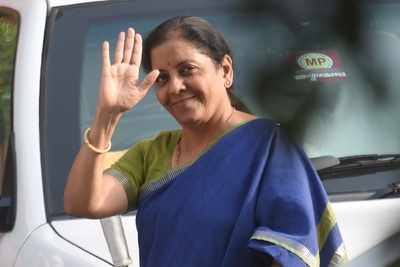NEW DELHI: In the campaign for the 2014 Lok Sabha elections, Nirmala Sitharaman often held the fort in the BJP office as spokesperson, offering on record responses and off record assessments on how the campaign was unfolding. Never flamboyant, she would bring a certain intensity to BJP’s media offensive even opponents would pause to acknowledge.
The same sincere application has been Sitharaman’s advantage in negotiating ministerial assignments and will be a key attribute in handling the finance ministry she takes over from Arun Jaitley. Her selection as defence minister was a surprise and the move to finance even more so. But as she showed in her handling of the complex and vast defence ministry, the current task will not daunt her.
Her long schooling in politics, and the organisational grind in BJP, has been a learning experience. Having negotiated resentments within the party and vocal BJP opponents outside, Sitharaman does not lose her nerve easily. This was well in evidence during her marathon speech defending the Rafale deal in Parliament, when she took up Congress chief Rahul Gandhi’s allegations point to point.
Her advocacy of the Rafale fighter contract brought out her ability to grasp the finer points of technical and financial negotiations without being drowned in jargon and presenting the argument in a manner that struck a chord with a non-specialist audience. Her dealing with military brass and defence bureaucracy was similarly straightforward, even if her insistence on pouring over files could at times be taxing.
After initial months in South Block, she found her feet and the process of acquisitions began to pick up pace. Once the Balakot air strikes became a key part of the 2019 campaign with Prime Minister Narendra Modi leading from the front, she forcefully articulated the government’s viewpoint that claiming credit for political will and giving credit to the armed forces could not be politicisation of the military.
It’s a trait that was visible in her earlier assignments as well. A surprise choice for independent charge of the commerce and industry ministry in 2014, Sitharaman dealt with complicated WTO negotiations at a time when India threatened to pull out of a deal if its concerns on procurement of foodgrains were not accepted. The crucial victory gave her the confidence to hold her ground in Nairobi two years later when the US sought to change the course of global trade negotiations.
She is no stranger to GST or the Companies Act either, having worked closely on both as a minister of state for finance five years ago. While expected to begin cautiously, Sitharaman will leave her imprint on the first budget she presents in July.
Published On : 01-06-2019
Source : Times of India

